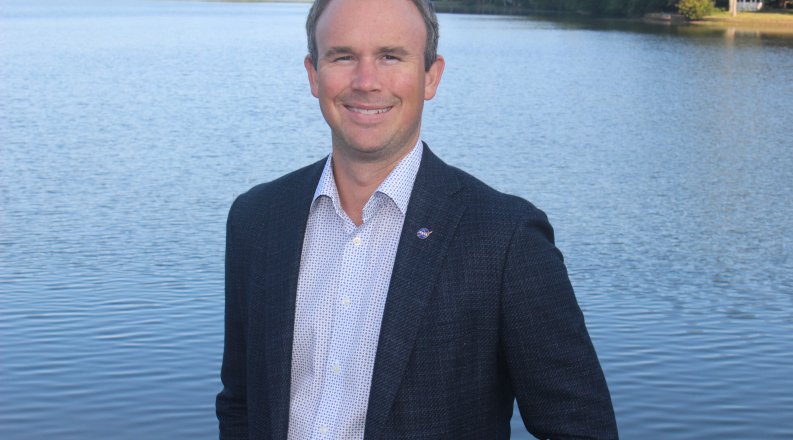David Borges ’10
Director, Committee on Earth Observation Satellites (CEOS) Systems Engineering Office, NASA Langley Research Center
David Borges, whose background is in geospatial analytics, got his start at NASA Langley in 2017. For most of his NASA career, he worked supporting the NASA Disasters Program, which provides timely, actionable science to aid organizations responding to disasters — an experience still near and dear to his heart, he says.
A little over a year into his new role as director of the Committee on Earth Observation Satellites Systems Engineering Office, Borges says the scope of his responsibilities have expanded to include climate change, sustainable development, and a global network of partners and end users, including many United Nations departments.
“Rather than country-level membership, national space agencies are our constituency,” he said of the roughly 50 international agencies that comprise the committee. They discuss topics like what satellites may launch in the next 30 or more years to monitor surface water temperatures, sea level rise, air pollution and other climate relevant issues and how that future data might be used for the good of all.
“We do active outreach, and we try to present a single coordinated effort on Earth science from space.”
Did you always want to work at NASA?
Absolutely not. I always thought NASA was interesting, and I also firmly believed that it was just beyond me. I never really gave it much thought. I kind of stumbled into my initial opportunity in 2017 through a series of different contracts. I supported the Department of Homeland Security, FEMA, Army National Guard, the National Geospatial Intelligence Agency and several other federal agencies. My supervisor at the time said, "Hey, you never would've guessed it, but NASA has a Disasters Program, and they want to create a geospatial portal and we're going to task you with helping set that up.” My first job (at NASA) was creating that.
What’s the best or most surprising thing about working at NASA?
I'm not a traditional Earth scientist, so the entire spectrum of the scientific community (at NASA) was quite the revelation to me. The people I get to work with are just super dedicated.
Also, I'm a military brat. My dad was an Air Force officer, so I grew up rotating around from a young age. Some people hate that — I thrived on it. I've always liked going to new places around the world. NASA is a bit unique in that we have a mandate to work globally since our fleet of satellites are constantly observing our whole planet, and I really appreciate that opportunity.
What’s the coolest or most challenging project you’ve worked on (or one that makes you most proud)?
Probably the multiple years I spent supporting disaster response for NASA. The last two to three of them, we have been working on launching a new program office called the NASA Disaster Response Coordination System (DRCS).
This new system (which launched in mid-June) coordinates, aggregates and serves out all relevant NASA information and data that's available in the context of disaster response to partners both domestically and internationally.
We're talking when a Category 3 hurricane landfalls in Virginia Beach, and we have flooding and wind damage. We're talking wildland fires on the West Coast of the U.S. and the crazy stuff that's been going on in Canada. We're talking about huge volcanic eruptions with smoke plumes that are disrupting global air travel.
All these disasters are based on natural hazards that are measurable from space. We're bringing data together and we're serving it out in common geospatial formats that the disaster response community can use.
How did ODU prepare you for what you’re doing now?
I can't say enough good things, specifically about the geography department. It did an excellent job preparing me for the workforce, from both technical and nontechnical (perspectives). Two professors in particular, Tom Allen and Hua Liu, are just phenomenal. Also, the geography department runs a job networking listserv, and I think that is so helpful to connect recent or upcoming graduates with entry-level job positions.
What would you tell young Monarchs to convince them to add NASA to their list of employers to explore after graduation?
NASA's a very big place and we work on a breathtaking diversity of activities. If you have a passion for making our world a better, more sustainable place, then I can almost guarantee there's probably a place for you at NASA.



